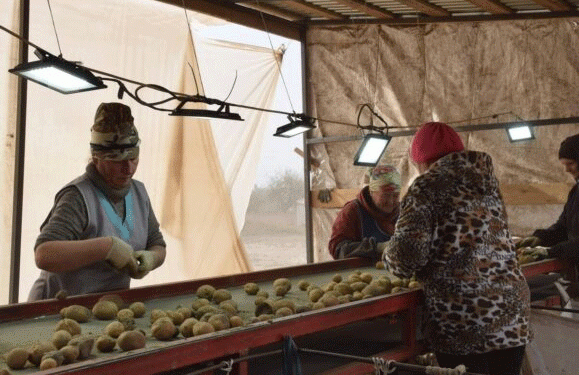Agricultural operations continue at full scale in the Klimovo District of Bryansk Oblast, where the Klimovskaya Potato Company is making significant efforts to harvest, store, and transport potatoes. With 2,200 hectares of potato fields, the region has faced a unique and challenging agricultural season. While June began with substantial rainfall, an extended drought dominated the following months, disrupting the expected yield and harvest timing.
Current Harvest Status and Yield Performance
As of October 1st, the company had yet to harvest 800 hectares out of their total 2,200 hectares. The yield, measured at 297 centners per hectare, provides critical insights into the impact of adverse weather on agricultural productivity. Comparing this yield to national and regional averages, Bryansk’s potato yield is slightly below optimal expectations due to inconsistent rainfall. Historically, potato yields in favorable years in Russia have reached around 350-400 centners per hectare, especially with the use of irrigation and advanced cultivation techniques.
Focus on Industrial Processing and Market Stability
The Klimovskaya Potato Company has specialized in growing technical potatoes destined for industrial processing, a segment crucial for the food manufacturing sector. Contracts were secured as early as March, with planned sowing tailored to meet these contractual demands. Despite the weather’s impact on harvest quality and timing, the company reports no issues with sales or distribution. Scheduled shipments are ongoing to processing plants in Moscow and Lipetsk oblasts, demonstrating a strong alignment between agricultural production and industrial processing needs.
Agricultural Adaptation Strategies: A Way Forward
The mixed weather conditions in Bryansk this year underscore the growing importance of adaptive strategies in agriculture. Drought-resistant potato varieties, efficient water management, and precision agriculture techniques are critical areas of focus for enhancing resilience. Furthermore, leveraging modern irrigation systems and soil health management can mitigate yield losses in future seasons.
Data from global sources indicate that climate variability has a profound impact on crop yields worldwide. A study by the Food and Agriculture Organization (FAO) highlighted that erratic rainfall and drought conditions have the potential to decrease agricultural productivity by 10-30%, depending on the crop type and region. In Russia, where potatoes are a staple and economically significant crop, adapting to these challenges is essential for maintaining both food security and economic stability.
The 2023 harvest in the Klimovo District serves as a reminder of the volatility that farmers face in today’s changing climate. Despite obstacles, strategic planning and contract management have ensured that potatoes grown for industrial use reach their destinations on time. Moving forward, investments in adaptive agricultural practices will be crucial for sustaining and potentially enhancing yields, even in unfavorable years.







